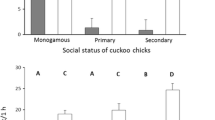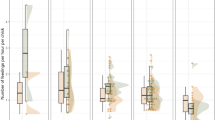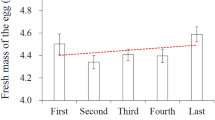Summary
The purpose of this study was to explain parental aggression to offspring in the moorhen (Gallinula chloropus). Males and females did not feed different subsets of chicks. In addition, there was a positive correlation between feeding rates of each parent to a particular chick and the number of attacks (tousles) directed to that chick, contrary to what was expected if aggression served to divide the brood. In moorhens, large chicks outcompeted small chicks for parental feedings. However, adults were more aggressive to large chicks and as a result small chicks spent significantly more time closer to parents and received more feedings than large chicks. In 84% of broods every chick was attacked at least once, although large chicks were attacked more often than small chicks. The behaviour of chicks changed immediately after an attack (Table 2). Before an attack chicks were <1 m from the parents while after an attack they were >1 m. The apparent effect of parental aggression in moorhens is to reduce demands by chicks for feedings. Aggression appears to reduce sibling competition and to encourage chick independence.
Similar content being viewed by others
References
Berger JC (1979) Weaning conflict in desert and mountain bighorn sheep (Ovis canadensis): An ecological interpretation. Z Tierpsychol 50:188–200
Brown LH, Urban K (1969) The breeding biology of the Great White Pelican (Pelecanus onocrotalus roseus) at Lake Shala, Ethopia. Ibis 111:199–237
Davies NB (1976) Parental care and the transition to independent feeding in the young spotted flycatcher (Musciapa striata). Behaviour 59:280–295
Davies NB (1978) Parental meaness and offspring independence an experiment with hand-reared great tits Parus major. Ibis 120:509–514
Desrochers BA, Ankney CD (1986) Effect of brood size and age on the feeding behaviour of adult and juvenile American Coots (Fulica americana). Can J Zool 64:1400–1406
Elliot BC (1969) Life history of the Red Warbler. Wilson Bull 81:184–195
Ferguson R, Sealy SG (1983) Breeding ecology of the Horned Grebe, Podiceps auritus, in Southwestern Manitoba. Can Field Nat 97:401–408
Forbes MRL, Ankney CD (1987) Hatching asynchrony and food allocation within broods of Pied-billed Grebes, Podilymbus podiceps. Can J Zool 65:2872–2877
Gibbons DW (1985) Cooperation, conflict and manipulation in the moorhen, Gallinula chloropus. Unpubl PhD thesis, University of Cambridge, Cambridge
Hinde RA, Spencer-Booth Y (1971) Effects of brief separation from mother on rhesus monkeys. Science 173:111–118
Horsfall JA (1984) Brood reduction and brood divison in coots. Anim Behay 32:216–225
Lack D (1947) The significance of brood size. Ibis 89:302–352
Mock DW (1984) Sibling aggression and resource monopolization in birds. Science 225:731–733
Nash L (1978) The development of mother-infant relationship in wild baboons. Anim Behav 26:746–759
Norton Griffiths M (1969) The organization, control and development of parental feeding behaviour of the Oystercatcher (Haematopus ostralegus). Behaviour 34:55–114
Nuechterlein G (1981) Asynchronous hatching and sibling competition in western grebes. Can J Zool 59:994–998
O'Connor RJ (1978) Brood reduction in birds: selection for fratricide, infanticide and suicide. Anim Behav 26:79–96
Ricklefs RE (1983) Avian postnatal development. In: Farner DS, King JR, Parker KC (eds) Avian Biology vol III. Academic Press, New York, pp 1–82
Rowe EG (1947) The breeding ecology of Aquila verreauxi. Ibis 89:576–606
Safriel UN (1981) Social hierarchy among siblings in broods of the oystercatcher, Haematopus ostralegus. Behav Ecol Sociobiol 9:59–63
Schaller GB (1964) Breeding behaviour of the White Pelican at Yellowstone Lake, Wyoming. Condor 66:3–23
Simmons KEL (1974) Adaptations in the reproductive biology of the Great Grested Grebe. Br Birds 67:413–437
Stamps J, Clark A, Arrowood P, Kus B (1985) Parent-offspring conflict in budgerigars. Behaviour 94:1–40
Trivers RL (1974) Parent-offspring conflict. Am Zool 14: 249–264
Wilkinson R, Huxley CR (1978) Vocalizations of chicks and juveniles and the development of adult calls in the Aldabra White-throated rail Dryolimnas cuvieri aldabranus (Aves: Rallidae). J Zool Lond 186:487–505
Wood NA (1974) Breeding behaviour and biology of the moorhen. Br Birds 67:104–157
Young EC (1963) The breeding behaviour of the South Polar Skua. Ibis 105:203–233
Author information
Authors and Affiliations
Rights and permissions
About this article
Cite this article
Leonard, M.L., Horn, A.G. & Eden, S.F. Parent-offspring aggression in moorhens. Behav Ecol Sociobiol 23, 265–270 (1988). https://doi.org/10.1007/BF00302949
Received:
Accepted:
Issue Date:
DOI: https://doi.org/10.1007/BF00302949




